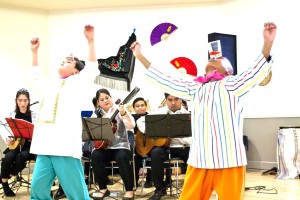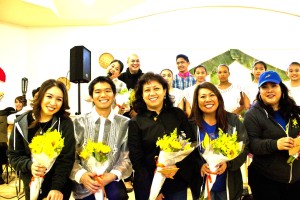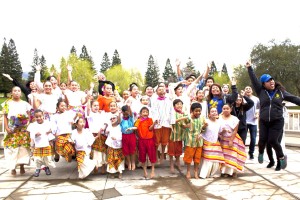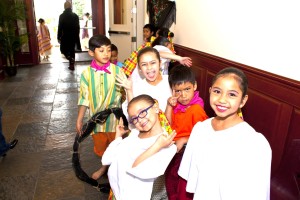Center marks 8 years of guiding Fil-Am kids through Philippine dance

ACPA students balancing glasses on their foreheads during the Binasuan dance. INQUIRER/Wilfred Galila
DANVILLE, California – A well attended end-of season-recital and a sold-out kamayan luncheon marked the 8th year anniversary of the American Center of Philippine Arts (ACPA) on February 19 at the Oak Hill Park Community Center.
The social hall of the community center was decked out in the style of a Philippine fiesta. The event was family oriented unlike previous years when dinner events were held mainly for sponsors.
This year was about “bringing family and friends over for the youth to experience their community and Filipino food. The fiesta spirit was here. Even when we’re not in the Philippines, we can bring it to our own kids and families,” according to ACPA Executive Director Herna Cruz-Louie.
The students performed pre-colonial and post-colonial inspired Philippine dances such as the sagayan, lalansay, kini-kini and darangen, which are Muslim dances from the Sulu Archipelago, and the Maria Clara, pitik mingaw. They performed as well dances from the countryside such as the gaway-gaway, sayaw sa pag-ibig, pasigin, binasuan, bakya and tinikling, all accompanied live by the ACPA Rondalla group. As a finale, the students sang Magtanim ay Di Biro (Planting Rice Is Never Fun) before bowing to a well-deserved applause and cheer.
Audience appreciation
“It’s always nice to see the appreciation from the audience,” Diana Lerma, ACPA program and costumes manager, said. “It gives the children that sense of pride of what they’re learning in terms of their Philippine culture.
ACPA provides Philippine dance classes for youth ages 5 to 17 through their Students Enriched in Education and Dance (SEED) youth program in Berkeley and Brentwood. It was founded in 2009 out of a concern and need.
“When I came to the States, I saw how Philippine dance, through dance troupes and classes, was not being taken seriously,” Jay Loyola, ACPA founding artistic director, said. “The majority of these programs were not really developed as a craft and education.”
The eight-year-old non-profit traces its roots from a class that Loyola conducted with a group of students at the Holy Rosary School in Antioch. Then, through a year-long residency at the Oakland Asian Cultural Center, Loyola took the opportunity to open ACPA with a handful of people: Herna Cruz-Louie, founding executive director; Jennifer Cruz Reyes, assistant artistic director and master dance instructor; Diana Lerma, SEED Berkeley program manager and costumes manager and Maria Honrada, SEED Brentwood program manager and costumes assistant.
All united in the vision of nurturing cultural pride and identity by sharing Philippine cultural arts to diverse audiences and creating a safe space for youth to gain confidence, self-respect and build a sense of community.
“I want to share the dance knowledge I have with my children and future generations,” Reyes said. “To share that with our kids and hopefully they’ll pass it on when they get older.”
“Studies have proven that when young people are strong with their identity, knew their histories and knew who they are, they’re just going to be more secure, beautiful, healthier individuals as adults,” Cruz-Louie said.
ACPA students recognize the value of the education they receive, but some begin to lose interest as they get older and become involved in other activities.
“It depends on how busy I’ll be in the future, but I would like to be with ACPA for as long as I can,” Jaylen Reyes, an ACPA student for eight years, said. “I’ve learned a lot of Philippine dances.”
Nevertheless, many former students return in their college years and after to give back. “They realize it was such an integral part of their lives. And we’re seeing that for the first time in eight years,” Cruz-Louie said.
“ACPA has been a great influence on my life,” Maegan Molo, a pioneer student who is now an ACPA assistant dance instructor in the Brentwood community, said. “I come back to try to enrich other children.”
Funding has always been a big challenge for the organization through the years. “As a non-profit, we survive according to the number of our enrollees and an annual fundraiser that we host,” Loyola said.
In spite of challenges, ACPA has grown with a stable program that effectively educates and instills a strong sense of culture and identity to its students through Philippine arts. It aspires to one day spread knowledge about Philippine arts, not only through dance and music, but also other art forms.
“If we could have our own center we could expand our programs, from dance and music, to visual arts and literature,” Loyola said.

ACPA founders and staff (back row left to right) Herna Cruz-Louie and Jay Loyola (front row left to right) Maegan Molo, Eric Dong, Diana Lerma, Maria Honrada and Jennifer Reyes. INQUIRER/Wilfred Galila
A native of Palawan and protégé of Philippine National Artist for Dance Lucrecia Reyes-Urtula, Loyola became a member of the Bayanihan Philippine National Folk Dance Company and went to places beyond the shores of his motherland, eventually coming to the United States bearing a gift he has shared with many as ambassador and premier choreographer of Philippine dance in the United States.
“From the time I came to the U.S. my medium was always dance, Philippine dance. The closer I am to doing that, the closer I am to the Philippines,” Loyola said. “It’s a platform where my students can define themselves as Filipino Americans. ACPA is where they form a center, a hub, during their formative years for them to have a cultural identity. It’s very significant. It’s very important for me.”









